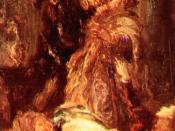The passage under study is taken from Shakespeare's Hamlet which was first performed in 1601 at the Globe Theatre.
The King, that is Hamlet's father, is dead and his uncle Claudius has already married his mother, the Queen Gertrude. Prince Hamlet then meets the ghost of late Hamlet who demands him to exact revenge from Claudius as he has poisoned him. Next, Claudius and Polonius his adviser apply themselves to trying to find the reason why Hamlet has become so upset notably confronting him with Ophelia who has rejected his love following her father Polonius's command. As for the Prince, he is determined to feign madness to gain time and prove Claudius's guilt. The coming of a band of players allows him to set a trap for the latter as he requests a play dealing with similar deeds to Claudius's to be performed. The excerpt under study is extracted from the middle of that performance.
Prince Hamlet's so-called madness supplies him with a excuse to play on words. Moreover, his scheme makes him enthusiastic and talkative. So, we will firstly examine Hamlet's behaviour in interaction with Claudius's. We will also consider to what extent his process is successful. Secondly, his conduct towards his mother, Ophelia and the others characters present will be studied.
For starters, the conflict that opposes Hamlet the protagonist to Claudius the antagonist constitutes the basis of the plot. Hamlet as the hero of the revenge play must actually avenge his father's crime. The band of strolling players who go to the castle of Elsinore agrees to perform The Murder of Gonzago which refers to Claudius and Gertrude's very actions. Hamlet indeed wants to have an evidence of Claudius's guilt since he fears the ghost with whom he talked to be an evil one, a "damnèd...



Good
Well written but is only emcompases a small part of the entire play. Could have been much better if expanded.
0 out of 0 people found this comment useful.